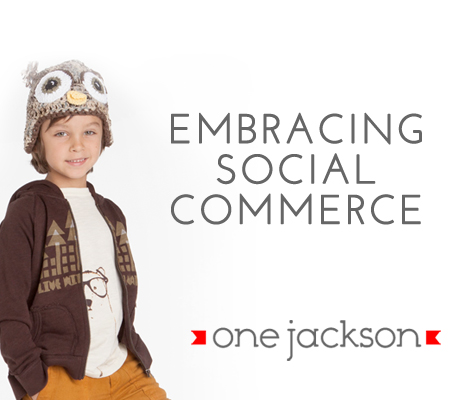BLOG/News & Press
One Jackson Launches Social Commerce Website for Indie-Design Kids Clothes
 What do you get when you bring together "crowdsourced design," "customer voting," and of course "cute kids clothing?" You get One Jackson, a startup based out of Silicon Valley headed by former execs from eBay, Gymboree and PayPal, and initial funding is by of a number of high-profile VCs, including four of the top female investors working together for the first time: Theresia Ranzetta, Accel; Patricia Nackache, Trinity; Ann Miura-Ko, Floodgate and Aileen Lee, formerly with Kleiner Perkins who is investing with her new seed fund.
One Jackson, the new kids clothing company, claims to be the first to use this business model in the kid’s space, giving independent and edgy designers relatively easy access to capital and a viable platform to get their designs to market. With One Jackson, the biggest winners, of course are the kids, who will be turned out in adorable, high-end duds that are unique and affordable. Prices range from $16-$42.
What do you get when you bring together "crowdsourced design," "customer voting," and of course "cute kids clothing?" You get One Jackson, a startup based out of Silicon Valley headed by former execs from eBay, Gymboree and PayPal, and initial funding is by of a number of high-profile VCs, including four of the top female investors working together for the first time: Theresia Ranzetta, Accel; Patricia Nackache, Trinity; Ann Miura-Ko, Floodgate and Aileen Lee, formerly with Kleiner Perkins who is investing with her new seed fund.
One Jackson, the new kids clothing company, claims to be the first to use this business model in the kid’s space, giving independent and edgy designers relatively easy access to capital and a viable platform to get their designs to market. With One Jackson, the biggest winners, of course are the kids, who will be turned out in adorable, high-end duds that are unique and affordable. Prices range from $16-$42.
 I had a chance to sign up with the site using my Facebook account, browse the current products and "Love" some of my favorites. There were a couple very unique Red Tricycle designs I would definitely purchase on a whim. As a Dad with three little ones at home, I could see this website being browsed by mom on the iPad at night. So with full support, I shared one of the designs to my Facebook page. From a functional standpoint, it's very straight-forward and easy for parents. I look forward to seeing more designs in the future. Maybe even penciling my own together.
Since we're talking Social Commerce, I thought it was important to get the perspective from one of the team members of One Jackson. Luckily I was able to get in touch with Anne Raimondi, a co-founder. I asked Anne, "What is Social Commerce and how is it changing the way people shop online?"
I had a chance to sign up with the site using my Facebook account, browse the current products and "Love" some of my favorites. There were a couple very unique Red Tricycle designs I would definitely purchase on a whim. As a Dad with three little ones at home, I could see this website being browsed by mom on the iPad at night. So with full support, I shared one of the designs to my Facebook page. From a functional standpoint, it's very straight-forward and easy for parents. I look forward to seeing more designs in the future. Maybe even penciling my own together.
Since we're talking Social Commerce, I thought it was important to get the perspective from one of the team members of One Jackson. Luckily I was able to get in touch with Anne Raimondi, a co-founder. I asked Anne, "What is Social Commerce and how is it changing the way people shop online?"
Social Commerce is discovering, buying, sharing, and even creating products based on information from people who matter most to you. Influencers, friends, and in the case of One Jackson, the original designers of the product. Consumers can now directly impact what gets made and designers can get feedback from customers every step of the way. Ultimately, the interactive nature of social commerce makes shopping more meaningful--we can have a direct say in what gets created, we waste less in making things no one wants, and we are connected to the individual creating what we consume.You can't argue with that. Having a say in what gets manufactured? Seems like a great combination of the customer being heard and indie designers having a marketplace for their hardwork. Love the model. Shop One Jackson.
More from the
DO Blog

Designing & Building Product Finder Quizzes for eCommer...
Strategy & Planning / December 23, 2020
View Blog Post
3 Customer Motivation Strategies to Improve Your eCommerce i...
Strategy & Planning / July 27, 2020
View Blog Post
